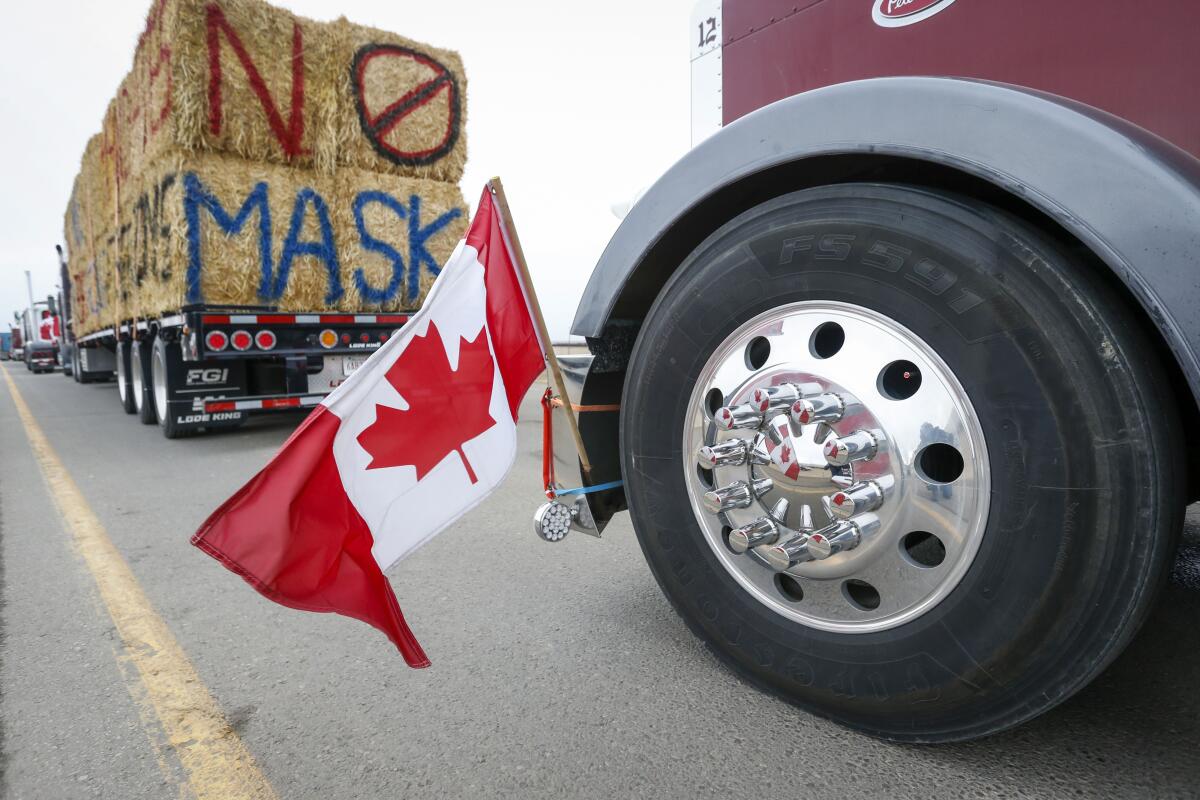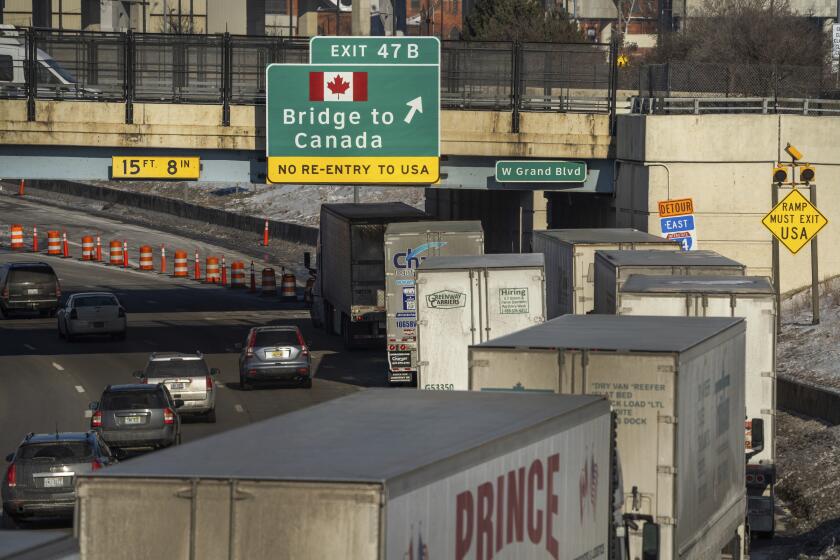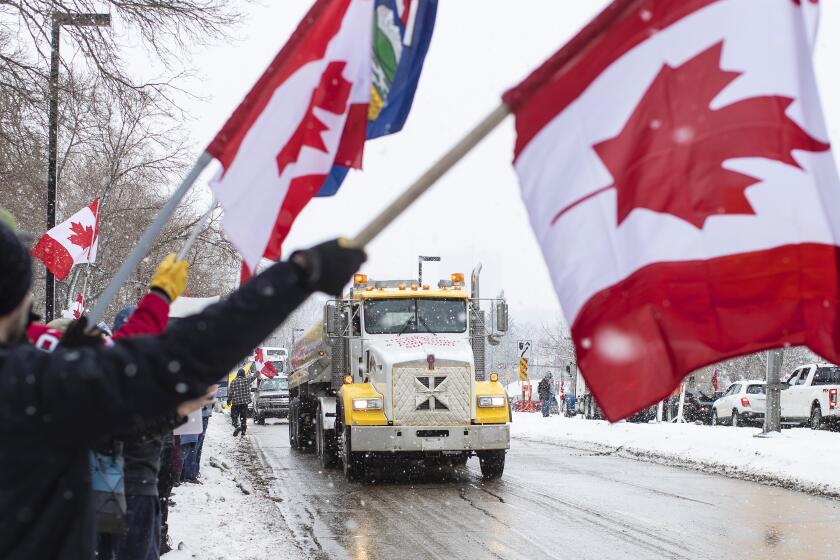Op-Ed: The occupation of Ottawa is unlike anything we Canadians have ever seen

- Share via
WINNIPEG, Canada — Here in Canada — sweet, peaceful Canada! — our nation’s capital is occupied by protesters in three-ton pickup trucks, effectively bringing normal life to a standstill.
For more than two weeks, we’ve seen jarring, surreal images coming out of Ottawa’s core — dancing on the Tomb of the Unknown Soldier, people urinating on the national war memorial — all of it accompanied by a near constant apocalyptic chorus of high-decibel air horns (until a recent court injunction). Confederate flags, swastikas, pro-Trump flags and white supremacists have all made cameos.
The city, now in a state of emergency, is on edge. Protests are occurring in other cities and at border crossings, where this week convoys blocked busy routes linking Canada to the U.S. — and disrupted supply chains of U.S. auto manufacturers.
The chaos is courtesy of a loose-knit group of individuals that is demanding governments repeal vaccine mandates and public health restrictions. They brand themselves as speaking for “truckers,” but neither the Canadian Trucking Alliance nor Teamsters Canada supports their positions — indeed, the latter organization says that 90% of its members are vaccinated. The deeper truth is that the convoy has become a melting pot for individuals with a wide variety of grievances and antisocial beliefs, and involves a larger international effort to interfere with our democracy.
The bumper-to-bumper demonstration by the self-proclaimed Freedom Convoy entered its fourth day Thursday at the U.S.-Canadian border
This has not stopped right-wing politicians both here and abroad from pandering to the group, defending the members’ right to protest “peacefully,” even though it has been clear for days that this event was neither wholly peaceful nor a protest. It is an occupation, and it is unlike anything we have seen on this soil in our lifetimes.
It was also a long time coming. Like most physicians, I’ve been nervously watching the anti-science movement grow for years, and the pandemic has put it on steroids. Many physicians who have been targets of these groups, such as Dr. Peter Hotez, have been warning of this growing threat. Aggression toward healthcare workers has become so commonplace that the Canadian government recently passed a national law that makes it an offense under the criminal code to intimidate doctors and healthcare workers, prevent them from providing care, or intimidate or block patients from receiving it.
I’m grateful for the new law; it was badly needed. But I’m puzzled by the singular focus on healthcare professionals. Many journalists, politicians (especially those who are women, BIPOC and LGBTQ) and activists experienced sustained abuse and harassment long before the pandemic. Catherine McKenna, Canada’s minister of infrastructure and communities, left public service last year. In an interview, McKenna described the harassment that she said left her perpetually on edge: “It was the constant threats, people verbally accosting my staff and defacing my constituency office and sending me smashed-up Barbie dolls.”
Those events, and others like it, should have been seen as flashing neon harbingers. Fringe and special-interest groups pushed the envelope, and there was little pushback. So they got bigger envelopes — and started sending them to more and more people.
Over the last two years, we’ve seen pandemic-related harassment at unprecedented levels — of teachers, school board trustees, pro-vaccine religious leaders, pharmacy owners, restaurant servers and bus drivers. While we can all appreciate that blocking access to a hospital is particularly vile, I’ve often wondered why our discussions aren’t more broadly focused on the national security threat posed to all citizens by people who commit these acts. Yes, healthcare is unique in certain respects, and it has been under a relentless strain since the start of the pandemic.
But should that mean our society has a lower tolerance for vile threats and harassment of healthcare professionals than, say a Cabinet minister, a restaurant owner promoting science-based policies or a journalist trying to report a story of local or national significance?
There is evidence that rudeness can have deleterious effects on a medical team’s performance, and like access to care, it’s not hard to argue for some exceptionalism when disruption to the norm can have fatal consequences. But the harassment that too many of Canada’s citizens are quietly enduring also has a performance and a psychological cost. And this cost seems to be completely acceptable to an alarming number of our politicians and leaders.
The mayor of Canada’s capital declared a state of emergency as protesters opposed to COVID-19 restrictions continued to paralyze Ottawa’s downtown.
As a writer, I’ve gotten to know a fair number of journalists over the last few years. It’s not an understatement to say that putting up with harassment has become part of their jobs. A senior editor at the Canadian Broadcasting Corp. described a level of abuse of reporters covering the recent national anti-vax protests that would have been unthinkable in this country a few years ago. Death threats, profanity-laced voicemails and obscene messages on social media are commonplace.
When I’ve experienced harassment, some journalists have given me well-intentioned advice to just “not think about it.” But that is a crude coping mechanism for individuals, not a strategy for organizations or societies when it comes to addressing the severe physical and psychological harassment of citizens just trying to do their jobs.
I am glad a Canadian law exists to try to keep people from harassing healthcare workers. But it also strikes me as almost absurdly specific, like thinking a pair of mittens has prepared you to face the gathering storm.
The more we make it about protecting any lone professional group, the more I fear we lose sight of the plot: Canadians are facing a broad and unprecedented massive national security threat, and we aren’t half as organized as the malevolent forces that are waiting to see what we are going to do next.
Jillian Horton is a writer and physician. She is the author of “We Are All Perfectly Fine: A Memoir of Love, Medicine and Healing.” @jillianhortonMD
More to Read
A cure for the common opinion
Get thought-provoking perspectives with our weekly newsletter.
You may occasionally receive promotional content from the Los Angeles Times.












